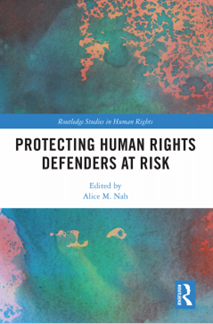Publication: Protecting human rights defenders at risk
Alice Nah has edited the lastest volume in the Routledge Studies in Human Rights series.

This volume assesses the construction, operation and effects of the international protection regime for human rights defenders, which has evolved significantly over the last two decades in response to the risks people face as they promote and protect human rights.
Drawing upon the experiences of 407 human rights defenders who continue to persevere in their activism in Indonesia, Egypt, Kenya, Mexico and Colombia, scholars and practitioners in this edited collection examine the ways in which formal protection mechanisms by state and civil society actors intersect with self-protection measures and informal protection initiatives by families and friends. The chapters highlight that protection practices are most effective when they are designed to address the specific risks that human rights defenders face (which are gendered and intersectional), reflect how defenders understand risk, security and protection and are appropriate for the dynamic socio-political and legal contexts in which defenders operate.
In the final chapter Dr Nah proposes ways in which the protection of human rights defenders at risk should be reimagined and practised. She argues for the need to broaden focus from the protection of human rights defenders to the protection of the right to defend human rights. She highlights the importance of protecting collectives along with individuals as well as to protect the families and loved ones of defenders. She emphasises the need to build inclusive human rights organisations, networks and movements with an intersectional perspective, in ways that address discrimination, violence and inequalities.
She calls for the development of diverse initiatives along the protection continuum – with practices aimed at emergency response at one end and the building of enabling environments for the defence of rights at the other. She notes the importance of developing formal protection mechanisms based on meaningful collaboration between state and civil society actors, which complement informal and self-protection initiatives. She calls for attention to be paid on how the flow of protection resources changes the power relations between civil society protection actors and human rights defenders and, last but not least, for the development of holistic understandings and practices of security for and with human rights defenders that include their wellbeing.
This book will be a thought-provoking guide for students and scholars of politics, international relations, law and human rights, as well as to practitioners engaged in the protection of human rights defenders at risk.